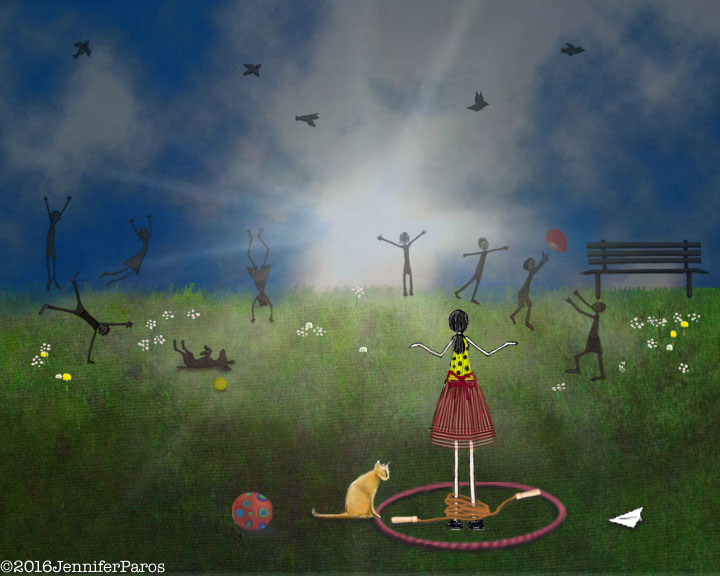Movement: The Heroic Act of Unsticking Ourselves
by Jennifer Paros
March 2016
What saves a man is to take a step. Then another step.
~ Antoine de Saint-Exupery
Years ago, a friend told me she felt nervous driving on highways, and so had eradicated them from her navigational plans. Though she seemed satisfied with her solution, I was wary of it.
My first year in college, I was uncomfortable leaving campus alone, and fell to always arranging grocery shopping or mall trips with friends. During this time, I hardly noticed that the mental muscles I needed to go it alone were deteriorating from lack of use. Not only was my world feeling smaller, my sense of myself was waning. Eventually, I saw how, in trying to avoid feeling uncomfortable through external manipulation of conditions, I was losing track of my internal strength.
Some writers experience writer’s block – in which writing becomes their freeway, their discomfort to be avoided. Whatever they’re thinking about themselves and writing leaves them uneasy. So, without realizing it, avoiding writing becomes a strategy for not feeling bad. Blocks aren’t constructed from lack of ideas or inability; they’re made of beliefs (for example, “I’m not good enough”) that clash with our desire (e.g. “I’m not good enough”).
Stories and lives compel us through the movement they express. We like to see people learn because it shows mental movement; we are enlivened to see action taken because it’s physical movement; and we are heartened when we see others love because that’s emotional/spiritual movement. It is not just in the physical realm that movement rehabilitates, strengthens, makes flexible, and balances. Movement in all the arcs of a story or a life enriches. And at the foundation of all kinds of movement is thought. We experience as much movement in our lives as our thinking allows.
In the film, As Good As It Gets, anti-social Melvin Udall has OCD: he avoids walking on the cracks in sidewalks, uses several bars of soap each time he washes his hands, and routinely checks and rechecks the locks on his front door. Melvin alters and restricts his behavior in service to his problematic thinking. Each of his behaviors soothes him, not because he’s actually avoiding danger, but because his thinking tells him he is. The habitual actions momentarily calm him, because Melvin believes he’s safely navigating a world that makes him uneasy. In truth, it is belief in his thoughts that is making him anxious. And in striving for greater and greater control externally, he is left feeling more out of control. But when some of his focus shifts to a desire for deeper connection to life (first through his care of a small dog, then through a waitress and his neighbor) his internal reactive narrative starts to lose its spell on him and his life starts to expand.
The burden is never life, it’s what you’re thinking and believing about life.
~ Byron Katie
When I was twenty-one, I got chicken pox from the kids at the day care where I worked. My skin became landscaped with itchy, oozing sores. Ten days later, though still marked, my face was clearing. I remember looking in the mirror, and every criticism I’d ever lodged at myself seemed in a suspended state. Instead of the usual assessment, judgment, guilty verdict, I saw my innocence. I was in appreciation, feeling as if I had returned home. Being ill had distracted me – it gave me a vacation from self-evaluation. As the physical symptoms diminished, for a time I remained in the glow of freedom from my own thinking – thoughts I hadn’t even realized were pulling me down.
When we evaluate, we impede movement. Though evaluation and assessment are considered tools for going forward, the act of evaluating requires a static focus. In assessment, our thinking becomes repetitive and unimaginative, because we consider and judge what is already known. Our past, even what we did 15 minutes ago, has no actual power over our next move. The freedom to go forward comes from the willingness to let go of analyzing where we are.
Because of his OCD, Melvin Udall attempts to control his every step to keep himself at ease, but by continually trying to manipulate outcomes, he binds his life. But life keeps calling him forward, as it does for us all. And as he starts taking small vacations from his overly vigilant mind, he is gradually moved onward to a richer experience.
When we avoid – whether freeways, sidewalk cracks, or writing – it indicates we’re not focused enough on what we want to embrace, and so have no access to the leverage for going forward. Movement, being “unstuck”, requires watching our every step less and savoring the next step more.
Jennifer Paros is a writer, illustrator, and author of Violet Bing and the Grand House (Viking, 2007). She lives in Seattle. Please visit her website at www.jenniferparos.com.

